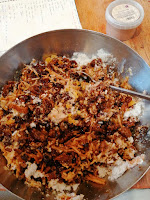Bring Us Some Figgy Pudding!
It's been over a year since I last updated this blog. In late November last year, my Mum died of dementia, and I have struggled to maintain proper momentum ever since. However, her greatest gift to her children was a love of hospitality, so preparing food for the Christmas festivities seems the best place to pick up my writing and honour her memory. I've made my Christmas puddings today, which always brings back to me the importance of family, both natural and created.
As children, we always had a home-made pudding at home. It was something my Grandma would make every year and bring with her on Christmas day. Mum was busy with young children and a large dinner (that's 'lunch' if you live in the south of England), and Grandma's pudding was a welcome help. With Grandma's death, though, the tradition of a home-made pudding came to an end, as Mum discovered the convenience of buying one ready-made from the supermarket. No shop-bought pudding ever tasted as good, but we put that down to our nostalgia for happy childhood memories.
In my adulthood, I have returned to home-made, because I have realised that our memories, however nostalgic, were not deceiving: Grandma's pudding really was better, and the reason for that is that it was lighter in texture. Mass-production demands that puddings are steamed in a hermetically sealed bowl, under high pressure, then chilled rapidly before packaging and distribution. Both the sealed bowl and the pressure cooking inhibit the pudding from rising, then the rapid cooling causes it to collapse. The result is the heavy, black lump that has put so many people off Christmas pudding altogether.
A steamed pudding is not difficult to make but it needs long, slow cooking. I guess this is the real reason people stopped making them at home. Do give it a try: November is the best time to make it, so the flavours have a few weeks to mellow and come together.
Steaming is the most gentle form of cooking. The temperature never rises above 100℃ so a family sized pudding will take as much as 7 or 8 hours to cook. Prepare the mixture the day before you cook it, and make sure you are free to look after it all day while it steams. I have been tied to the house all day, making sure my steamer never boils dry, and my steam-filled kitchen now resembles a public bath house! No matter, the result will be more than worth the minor inconvenience. At least it's given me the push I needed to write again.
I have alluded to my pudding recipe in past blog posts but never published it here. Time to put that right, in the hope some readers will give it a try and discover just how delicious a Christmas pudding can be.
(All measure are given in imperial, as this is adapted from a recipe of a couple of generations ago.)
Prepare your steamer: use an electric one or sit a steamer vessel on top of a decent pan of boiling water. If you have neither, place a trivet or upturned saucer into the bottom of a large pan. Sit your pudding on that and add boiling water to about half-way up the bowl. You don't want water getting past the string and under the papers, so be conservative. You're going to have to top the level up occasionally, anyway. Steam your puddings for 7-8 hours, adding more water from time to time, to make sure the steamer never boils dry. At the end of this time, lift the puddings out and let them cool a little, before removing the covers to let them cool completely. When cold, sprinkle the surface of the pudding with a few drops of rum, and cover with clean papers & lids. Store them in a cool, dry and dark place until Christmas.
.jpg) |
| In memory of Alicia Fogarty 1941 - 2023 |








A lovely reminder of the past and a great tasting pudding to look forward to.
ReplyDeleteThank you
Delete